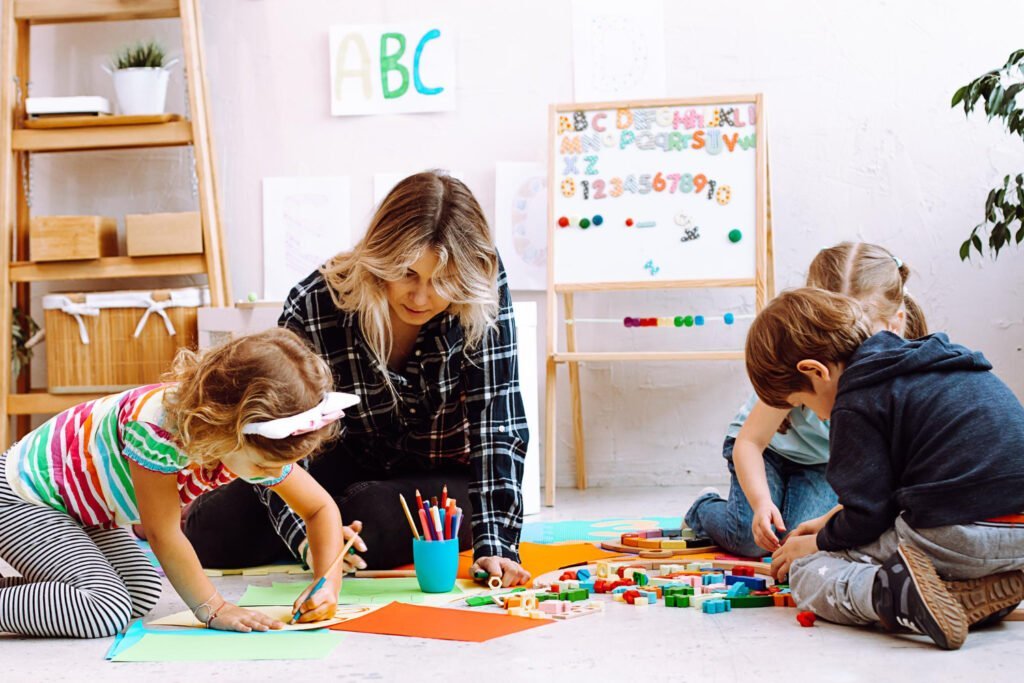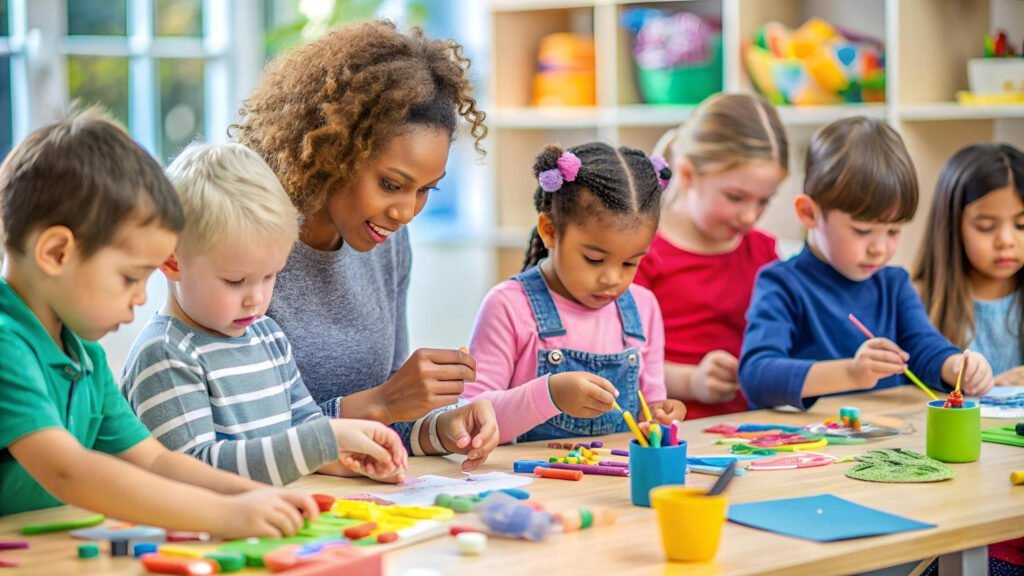Do Kids Need to Go to Preschool? Experts Weigh In on This Controversial Topic!
Introduction: The Great Preschool Debate!
Do children have to attend preschool? This question generates lively debates among parents all over the world! Imagine where your young one can play, learn, and develop with their peers. However, do kids need to go to preschool? Let’s explore the thrilling world of early learning and discover the truth behind this enthralling question!

Overview of Preschool Education
Preschool is a fun early learning environment for children ranging from 3 to 5 years old. The years between three and five are essential for developing social and cognitive skills. Are children required to attend preschool? Yes! Preschool provides children with structured environments that encourage the development of literacy, numeracy, social interaction, and emotional resiliency. It’s like a launching pad for their future academic journeys!
Preschool is where children are exposed to a delightful mix of structured and play-based activities. Through storytelling, outdoor adventures, and creative art projects, every day is a thrilling journey of growth and learning. The curriculum is designed to foster critical thinking, problem-solving, and independence while making learning a fun and exciting adventure!
As more parents realize early education is importance, many parents ask: Do kids need to go to preschool? It’s typically yes! Participation in preschool can help children learn skills such as communicating effectively, teamwork, and self-control.
The Debate: Is Preschool Necessary for Child Development?
The debate about whether kids should attend preschool has been a constant debate. The argument is that preschool is crucial to develop children’s early development. Research has shown preschool children have a head start on learning to read and write letters, two essential elements for academic success. In addition, preschools promote interactions with others that aid children in learning to interact with others and manage emotions.
Experts from the American Academy of Pediatrics emphasize that high-quality early education programs assist in socialization and reduce behavioral issues. Do kids need to go to preschool? Yes! The structured learning environment can aid in cognitive development during these crucial years.
Some critics argue that children can flourish in a home-based environment, even without formal education. They believe personal care at home fosters natural learning and creativity. Learning through play and informal learning can be equally beneficial!
The research shows mixed results regarding the importance of preschool. While some studies show positive long-term effects on children who attend preschool, others show little or no difference in those who do not. It’s important to note that some children may not thrive in a structured environment, and the transition to preschool can be challenging for both the child and the parent. Whether children need to attend preschool depends on their situations and preferences.

The benefits of preschool Socialization and Interaction Peers
One of the significant advantages of preschool is its role in developing social skills. Young children are given numerous opportunities to interact with their peers in these environments, laying the foundations for crucial social abilities. The immense social benefits of preschool are not to be overlooked, providing children with friendships that are crucial to their happiness and development. So, do kids need to go to preschool? Absolutely!
Preschool provides children with friendships that are crucial to their happiness and development. These relationships offer emotional support as well as a sense of belonging. Children learn how to create connections and initiate interactions, skills they’ll need throughout their lives.
Furthermore, preschools help teach collaboration and sharing through group and structured activities. Children learn the importance of working in teams to achieve common goals. This is a valuable skill that goes that goes beyond play!
Preschool also teaches children about social expectations. The guided interactions allow them to grasp concepts such as waiting for their turn and observing personal space. These are essential lessons to navigate complicated social settings later on.
Furthermore, peer interactions in preschool improve emotional intelligence. Children learn to understand and react to their peers’ emotions, increasing empathy and emotional regulation abilities. These experiences pave the way for patience, conflict management, and understanding critical elements of emotional intelligence.
In short, the benefits of social interaction in preschool are numerous! The children who attend these early learning environments develop essential social skills that will set an excellent foundation for future interactions. So, when considering whether do kids need to go to preschool, remember that these early experiences can significantly impact their social development.
Early Development of Cognitive and Motor Skills
Preschool plays an essential role in the development of motor and cognitive skills! Children participate in activities within this structured setting to improve gross and fine motor abilities. Fine motor skills are based on using tiny muscles in fingers and hands, which are essential to writing or buttoning clothing. Activities such as coloring or making blocks aid in developing these skills.
The gross motor abilities are muscles that are larger than those used for the sport of jumping or running. They are also nurtured through playing outdoors!
Cognitive development is a different aspect of the early childhood experience. Through themed lessons and interactive games, preschoolers participate in problem-solving exercises that test their thinking abilities. Skills such as the ability to recognize patterns and improve memory are developed through storytelling and games.
The structured setting also offers stability crucial for children’s emotional development! Daily schedules aid children in understanding how to manage their time while fostering social skills through interaction with peers.
In the end, the benefits of preschool go beyond helping prepare children for elementary school. They establish a strong foundation for cognitive capabilities that will support children throughout their academic lives. When considering whether do kids need to go to preschool, remember that these early experiences are vital for holistic development!

Academic and Developmental Advantages: Foundation for Language and Math Skills
The first years of childhood are crucial to cognitive development, and preschool plays a vital role in building a solid academic base. By focusing on language and math skills, preschool prepares children for the demands of elementary school, ensuring that they start their education with a strong foundation.
The most important benefit is the early literacy development! The preschool curriculum enhances comprehension, vocabulary, and phonemic awareness through phonics sessions and storytelling activities. This ensures that kids are prepared for the challenges of reading ahead.
Preschool also introduces foundational math skills via counting games and arithmetic-based exercises that can be easily integrated into daily routines. These games help children develop problem-solving skills and teach numbers. It’s a great way to teach young children!
Language development extends beyond reading; it includes effective communication, too! Activities in groups encourage children to communicate clearly, which aids in the development of social and interpersonal interactions.
Exploration is the best way to stimulate curiosity! Teachers develop activities that foster curiosity. Nature walks and scientific experiments that inspire continuous learning.
Knowing whether “Do kids need to go to preschool?” is essential since it builds a solid base that equips students with the vital skills for academic success in the future!
Considerations for Parents: Assessing a Child’s Readiness for Preschool
Whether your child is prepared for preschool is crucial! Parents must assess their child’s development, emotional maturity, readiness for school, and maturity in social interactions when deciding whether their children should be enrolled in preschool. So, do kids need to go to preschool? Understanding these factors can help answer that question.
The term “developmental readiness” refers to determining whether your child can perform basic self-care activities, like following directions and using the restroom independently. Do they remain quiet in the story time? If yes, they could be prepared!
The emotional preparedness of children is also essential! Children should be able to handle short breaks from caregivers easily when they communicate their needs verbally. This is a sign they’re prepared for new experiences.
Social maturity is about positive interactions with your peers! Preschool is a time for sharing and taking turns. Watching behavior during playdates may give insight into the level of the child’s readiness.
Family needs are also essential! Be aware of work schedules versus your life routine when deciding about enrollment options.
Choosing the type of preschool program (structured or. play-based) visiting schools will help you determine the best program for you!
The result is that a thorough evaluation of the above factors aids parents in determining if children should attend preschool. Ultimately, understanding whether do kids need to go to preschool involves considering these essential aspects of readiness!
Alternatives to Traditional Preschool: Home-Based Learning Programs
Unsure parents, “Do kids need to go to preschool,” There are various options! Learning programs at home can be flexible and a personalized learning experience.
Playgroups are informal spaces that allow children to interact with their peers and develop social skills without the traditional structure!
Classes in community classes like sports or art inspire children to be in their creative pursuits while also enhancing their physical capabilities. This allows the children to be taught in a structured way outside of traditional preschools!
Parents can incorporate informal learning activities at home, too! Integrating educational toys and activities into your daily routine makes learning fun while tailoring the experience to each child’s needs!
These options are flexible, unlike traditional preschools. However, they need time commitment from parents who might be concerned about the limited interactions with peers compared to classrooms.
Parents must consider these aspects when deciding whether alternatives are compatible with their educational goals!

Potential Drawbacks: Cost, Accessibility, and Quality Concerns
Parents face many significant issues when considering “Do kids need to go to preschool?”. One of the primary issues is the cost of preschool programs. A quality early childhood education can be costly, placing families under financial pressure. According to data from recent years, the cost per year of preschool may be comparable to the price costs for tuition at colleges in certain regions, making it an investment of a significant amount that cannot be a reality for every family.
Accessibility is an additional problem. Many families cannot easily access high-quality preschool programs, especially those in urban or rural regions. Even in preschool areas, a high demand often outweighs the available space, resulting in lengthy waitlists and a lack of choices for parents. The accessibility issue can be particularly problematic for families with lower incomes, making it more difficult.
Alongside the cost and accessibility issues, variance in the quality of programs and staff training is a serious issue. Some preschool programs follow the same guidelines and the tendencies between the program curriculum and qualifications in the learning experience overall. Parents might be concerned about the sufficiency of the school’s environment, the teacher-to-student ratio, and the qualifications of the educators in charge of their child’s development.
In addition, despite the advantages that preschool can bring, some kids might be afflicted with anxiety or stress as they begin a new school. Transitioning from home to preschool can be a challenge, especially for those who have not yet spent many hours without parents, who are their primary caregivers. Awareness of and dealing with these emotional stress issues is vital in ensuring children enjoy the best preschool experiences.
Parents should look into preschools’ financial aid programs, scholarships, and sliding-scale charges to overcome these issues. Also, analyzing and choosing reputable preschools with accredited accreditation and visiting several preschools to view their surroundings will help you make educated choices. Knowing a child’s requirements and ability to learn in preschool and open communication with teachers can help facilitate the transition and create an environment that encourages learning.
Conclusion: Making an Informed Decision
When looking at the different aspects and factors surrounding preschool education, it is evident that deciding whether or not a child needs to attend preschool is highly personal and complex. Each child’s development requires temperament and rate, meaning that what is most effective for one child might not work for another. Parents are, therefore, urged to evaluate a particular program’s benefits and possible drawbacks.
Preschool provides a structured and safe environment that can help develop essential social, emotional, cognitive, and abilities. The preschool provides children with opportunities to participate with others in group-based activities, build friendships, and learn to communicate within a peer group. Early exposure to organized educational activities can create a solid base for learning in the future that will prepare them to take on the curriculum for elementary schools. Additionally, preschool helps identify developmental problems early, allowing timely intervention.
However, confident children prefer less formal environments, more intimate interactions with parents and caregivers, and, or participating in learning activities at home. Family dynamics, financial concerns, and cultural values are significant in the selection process. With the variety of available preschools, from traditional settings up to Montessori or Waldorf schools, families can select a setting that is most closely with their child’s requirements and values of the family.
In the end, even though the question “Do kids need to go to preschool?” isn’t a universal answer, it is a matter of carefully considering all the factors and taking note of your child’s specific requirements. Meeting with teachers, attending possible preschools, and obtaining advice from other parents may give valuable insight. Keep in mind that the aim is to encourage your child’s growth by providing a setting that’s both positive and conducive to a lifetime of learning.
Recommended Resources for Preschool Learning
The Very Hungry Caterpillar
A beloved classic that introduces children to counting and days of the week through a delightful story about a caterpillar’s journey.Brown Bear, Brown Bear, What Do You See?
This engaging picture book helps preschoolers learn colors and animals while encouraging participation through repetition.The Whole-Brain Child
A fantastic resource for parents that offers strategies to nurture children’s emotional and intellectual development.Chicka Chicka Boom Boom
An entertaining alphabet book that makes learning letters fun with its rhythmic text and colorful illustrations.Calendar For Preschoolers
A great tool for teaching children about days, months, and seasons while helping them understand time concepts.Preschool Big Fun Workbook
Packed with activities covering various subjects, this workbook is perfect for reinforcing preschool skills in an enjoyable way.School Zone Big Preschool Workbook
A comprehensive workbook filled with exercises that promote early literacy, math, and critical thinking skills.
For more insights on reading levels and how to support your child’s literacy journey, check out my blog post: 5 Essential Tips to Determine What the Reading Level for Kindergarten Should Be! at Mamawithlove.





































































